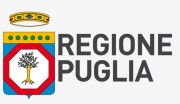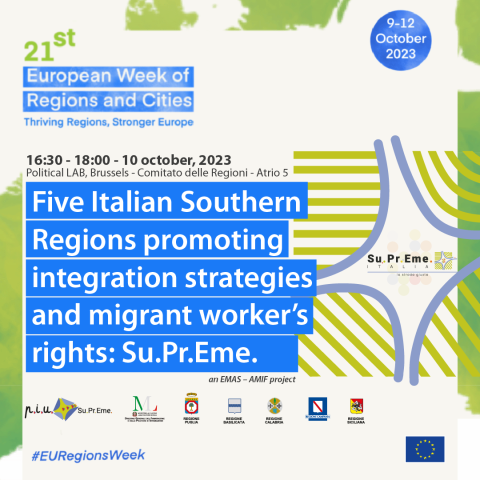
A shared place-based strategies model, co-programmed and implemented by an interregional multi-level governance system, involved more than 120 local stakeholders and enabled jointly developed evidence-based “Do No Harm to Cohesion” solutions, integrating housing, public services and job facilitation into needs and potential of regions lagging behind. SUPREME, an AMIF-funded pilot programme (2019-23), aims to fight illegal employment and integrate migrants in five Italian southern regions
- Territorial | Rural | Local and regional | Governance and Public administration | Cohesion | Social inclusion and Equality | Migration
- Code: 10PL23622
- Jacques Delors building, Atrium 5
Practical information
- When
-
Tue 10/10/2023, 16:30 - 18:00 CET
- Where
- Jacques Delors building, Atrium 5
- Type of partnership
- NONE
- Format
- Participatory/Political lab
- Theme
-
Promoting social innovation
- Language
- English
- Websites
-
https://www.regione.puglia.it/
https://por.regione.puglia.it/
https://www.facebook.com/quiregionepuglia
https://instagram.com/regionepuglia
https://www.linkedin.com/company/regionepuglia/
http://twitter.com/RegionePuglia
https://integrazionemigranti.gov.it/it-it/Dettaglio-approfondimento/id/8/SUPREME-e-PIUSUPREME
http://www.consorzionova.it
- Social media
-
@piusupreme
Su.Pr.Eme. Italia
@supremeitalia
@nova.consorzio
NOVA Consorzio Nazionale per l’innovazione sociale
PIU Supreme
@consorzio_nova
@quiregionepuglia
Regione Puglia
@regionepuglia
@RegionePuglia

Partner

Documents
Reporting
Session summary
Roberto Venneri (Apulia Region, Project Leader) retraced the phases and motivations that led to the birth of Supreme as part of the three-year Plan to Combat Labor Exploitation in Agriculture and Caporalato 2020 - 2022; the Project - approved within the specific Tavolo Caporalato, promoted by the DG Immigrazione of the Ministry of Labor and Social Welfare of the Italian government - represented an important experimentation carried out by the five regions of southern Italy (Apulia, Basilicata, Campania, Calabria and Sicily);
Mario Morcone (Campania Region), highlighted the extraordinary plan of interventions created to support the legislative initiatives underway and the three main strategic objectives:
• support for the system of regional and local authorities in the areas concerned;
• strengthening of services present in formal reception systems;
• strengthening governance capacity.
Stefania Congia (DG Immigration, Ministry of Labor) explained the objectives of the three-year plan to combat labor exploitation in agriculture and caporalato 2020 - 2022 and the law enforcement policies.
Subsequently, those registered for the event were divided into 5 working groups, in which the following results were achieved:
• Multilevel and multistakeholder interregional governance (Puglia Region): necessity to make the local network burst Keep on managing the complementarity between funds Create synergy with more EU regions to share good practices Create bottom-up cooperation involving the private and public social sector;
• Different forms of severe exploitation in europe and the applicability of the Su.Pr.Eme. Italia/P.I.U. Su.Pr.Eme. model in different contexts (Calabria Region): highlight the condition of migrant women and analyze the prospects for improving it;
• Empowerment processes of beneficiaries and the role of CVOs in antiexploitation policies (Campania Region): creation of greater civil and social organizations that can guarantee intermediation with migrants;
• The importance of communication in narration and agenda setting (Sicily Region): show the reality of the facts, without emphasis or strategies;
• Tools for combating labor exploitation (Basilicata Region): provide for further protection measures, in addition to those already existing.
The results of the Working Groups were reported in the last part of the Plenary Session, with the presence and support of the prefect Maria Forte (Internal Ministry Central Directorate for Migration Policies - FAMI Authority).
Next, Beate Gminder from DG Home took the floor, recognizing the Supreme Project as a successful model of multilevel and multistakeholder governance, capable of intervening to counter the phenomenon of 'caporalato'/labour exploitation; in addition, Gminder presented Projects and Funds pertaining to different Services of the European Commission (DG HOME, DG RECOVER, EMPL, DG AGRI..).
In conclusion, Maria Letizia Diliberti for the Sicilian Region (next coordinating Region), emphasized the will to continue the implementation of Supreme around the 3 Pillars: KNOWLEDGE, COMPETENCE, IMPACT, systematizing and making structural the multi-level and multistakeholders governance model.



